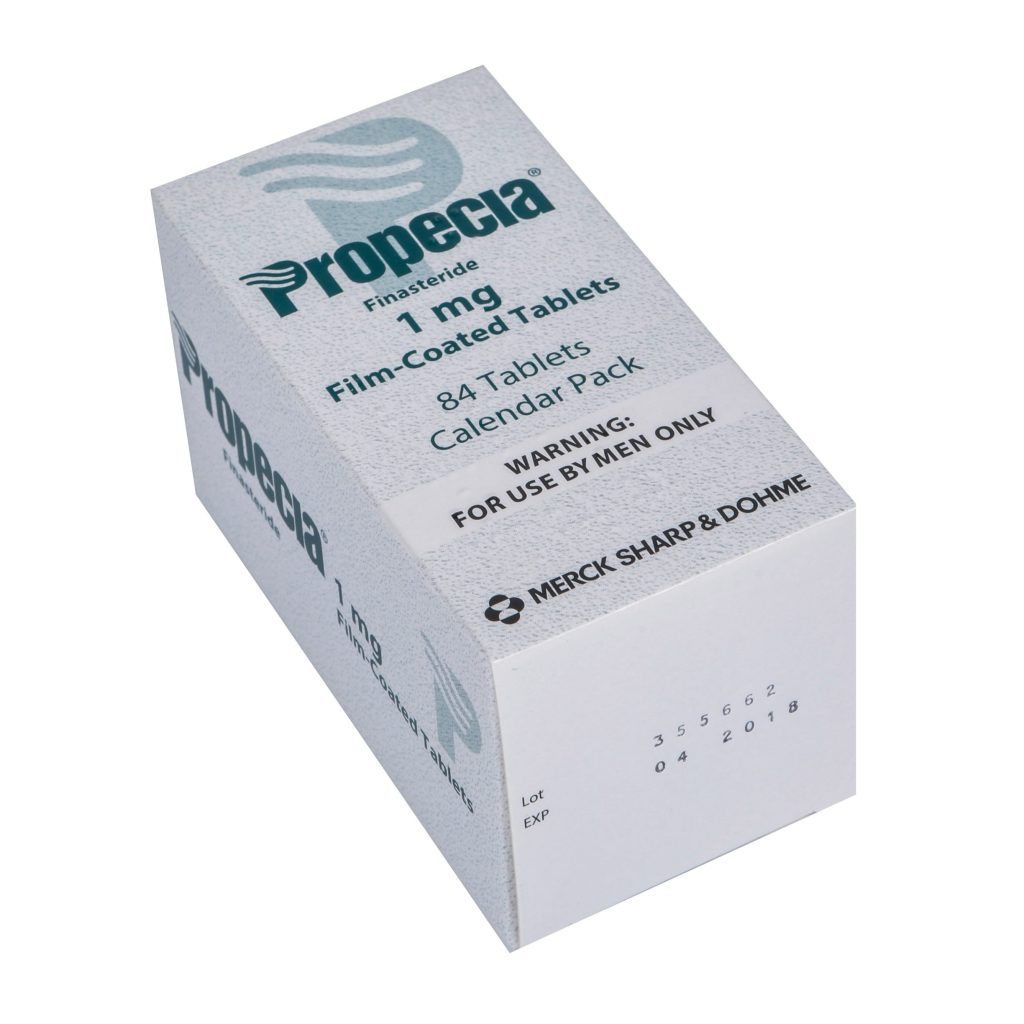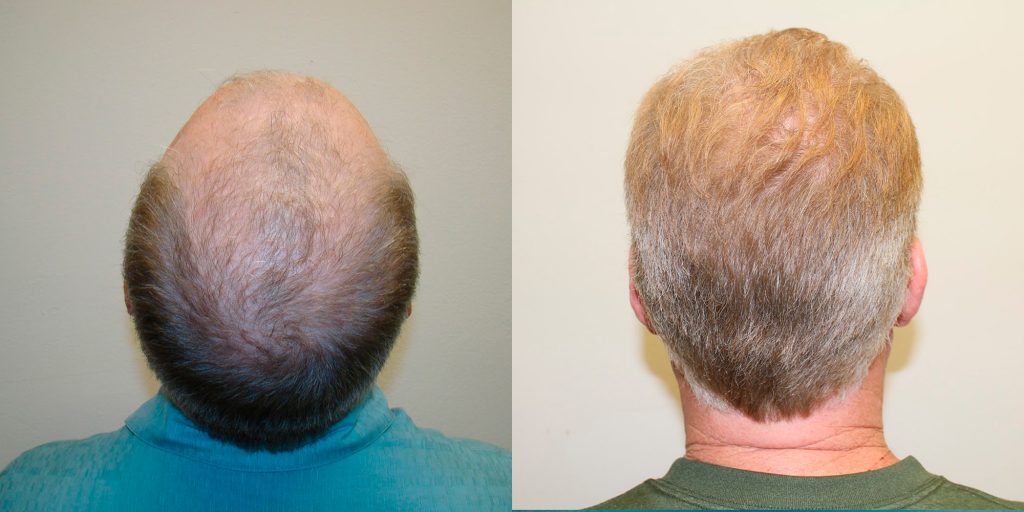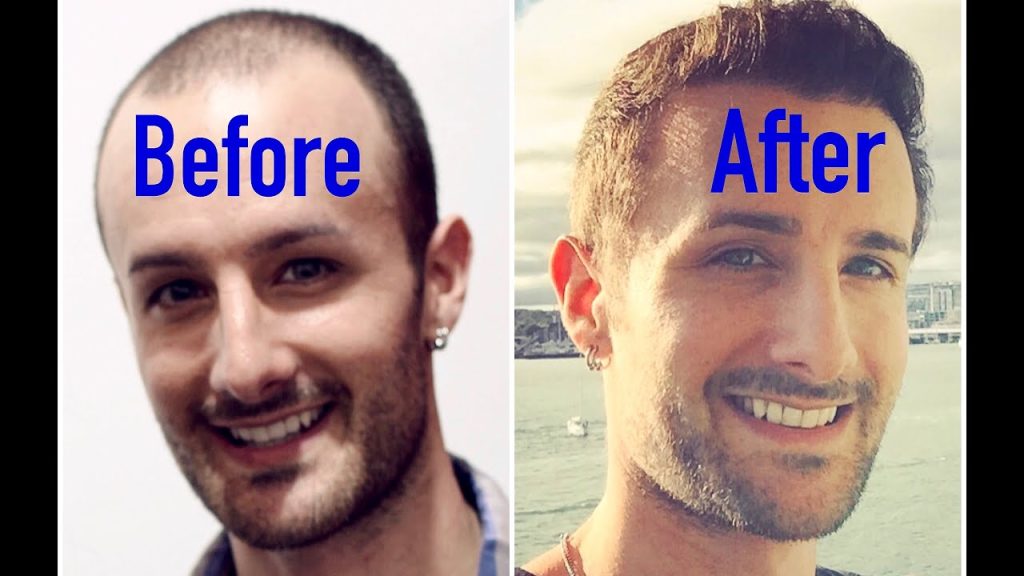Propecia is a drug that can be used to combat hair loss. It contains the ingredient finasteride, which can also be used to successfully treat benign enlargement of the prostate. The active ingredient in a small dosage stops hair loss that has hormonal causes. It is used to treat androgenetic alopecia. This type of hair loss is triggered due to sex hormones.

Propecia for men only
Dihydrotestosterone and Propecia
The male hormone DHT (dihydrotestosterone) acts on the genetically susceptible hairs. These are especially found in the crown area, the top of the head and the forehead area. In these areas, the sex hormone causes androgenetic hair loss. DHT causes a shortening of the growth phase of the hair. This causes the hair to become finer and shorter until it finally falls out. Hair loss is a common side effect of aging. It affects 80 percent of all men around the world. Androgenetic alopecia is also considered to be hair loss of the male type. Propecia is a medicine suitable for men who suffer from mild to moderate hair loss.
The preparation is used for hormonal and hereditary hair loss. For some men, hair loss starts in their twenties, while for others it occurs much later. Genetically caused hair loss occurs when the hair follicles change due to the negative influence of the corresponding degradation products of the male sex hormone. This form of hair loss can be treated by taking Propecia.
Propecia – to prevent balding
Finasteride is the name of the active ingredient in Propecia. This is a steroid-like compound. The active ingredient in Propecia functions as a specific inhibitor of a 5-alpha reductase. The enzyme is responsible for the conversion of testosterone in dihydrotestosterone. Moreover, again the DHT directly affects the hair follicles and causes them to shrink more and more. Then the hairs do not last as long, whereupon they fall out more and more. However, Propecia has a positive influence on hair growth.

Propecia not only supports new hair growth. It also has a good effect on the reactivation of all hair follicles. The drug inhibits the production of dihydrotestosterone, which is formed in the body from testosterone. In men who are genetically predisposed to it, DHT causes a reduction and subsequent atrophy of the hair roots. The active ingredient finasteride is not a hormone. Instead, it blocks the enzyme by which dihydrotestosterone is produced. In the body, due to the absorption of Propecia, the level of the male sex hormone is not changed. The effect of the drug can only be seen where complete regression of the hair roots has not yet occurred. Therefore, treatment with Propecia does not show any effect in cases of complete hair loss. Moreover, studies prove that the effect of the drug in reducing hair loss is better in the back of the head compared to the forehead. One can expect the first positive results at the earliest after a therapy that lasts at least three months. In many cases, hair loss stops after about three to six months of regular use of Propecia. If treatment continues, the drug may even provide further hair growth. To develop the full effect, the therapy should be carried out for at least twelve months. However, the effect is only guaranteed if the treatment is continued continuously. Hair growth also decreases again if the therapy is discontinued.
Side effects of Propecia
A particularly thin polymer layer coats the tablets of the drug. This masks both the smell and the taste of the ingredients so that they are easier to swallow. In addition, the coating over the tablet core is considered a protective layer. You take the film-coated tablets whole with enough liquid. It is possible to take Propecia at any time of the day regardless of any meals. This preparation is not suitable for adolescents. There is no research to support the effect of finasteride in males under 18 years of age. Pregnant women should not take Propecia under any circumstances, as even contact with broken or crushed tablets can be risky. This is because the active ingredient finasteride is absorbed not only through the mouth but also through the skin. This can result in malformations of the sex organs in a male embryo. If a pregnant woman comes into contact with Finsteride, it is important that she contacts a doctor immediately. Because of the fetus-damaging effect, men must not donate blood while taking Propecia to prevent accidental transfer to pregnant women. After stopping the drug, it is advised to wait at least four weeks until the next blood donation.

Clinical studies showed only a few side effects of the preparation. These occurred only in isolated cases. In the further course of the test series, the unpleasant side effects disappeared by themselves. Some disappeared after the therapy with Propecia was discontinued. Treatment should not be continued and a doctor should be consulted immediately if swallowing difficulties, oozing and itchy skin rash and breathing difficulties occur. If there are any changes in the breast tissue such as discharge from the nipple, pain, lumps or enlargement of the breast, it is also important to consult a medical professional as these are possible signs of breast cancer. Occasionally, symptoms of taking Propecia include decreased desire for sexual intercourse, problems with erection, ejaculatory dysfunction, decreased ejaculatory volume, and depression. Other possible side effects include sensitivity to touch, itching, rash, blood in the semen, testicular pain, and palpitations. After therapy is discontinued, men may experience infertility, ejaculation problems, decrease in semen quality, increase in certain liver enzymes, and anxiety.
Tags:
buy propecia usa,buy finasteride europe,
buy finasteride 1mg,propecia side effects,buy finasteride 5mg,propecia canada,buy propecia uk,finasteride online

